4级翻译虚拟语气讲解精选+习题
- 格式:doc
- 大小:154.00 KB
- 文档页数:13
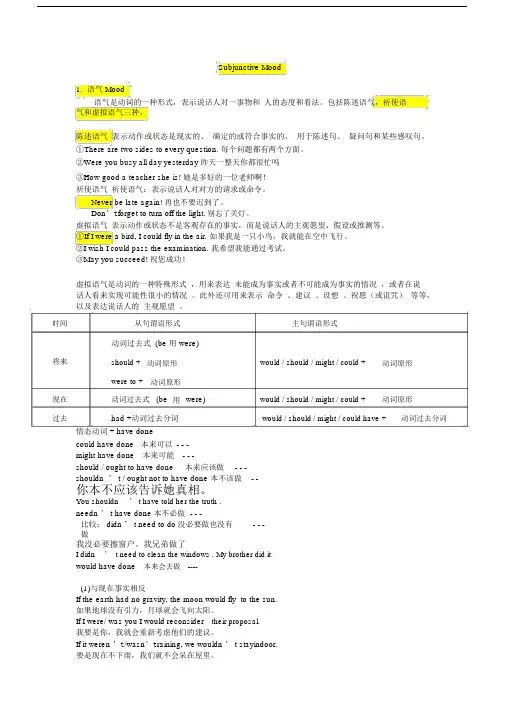
Subjunctive Mood1. 语气 Mood语气是动词的一种形式,表示说话人对一事物和人的态度和看法。
包括陈述语气,祈使语气和虚拟语气三种。
陈述语气表示动作或状态是现实的、确定的或符合事实的,用于陈述句、疑问句和某些感叹句。
①T here are two sides to every question. 每个问题都有两个方面。
②Were you busy all day yesterday 昨天一整天你都很忙吗③How good a teacher she is! 她是多好的一位老师啊!祈使语气祈使语气:表示说话人对对方的请求或命令。
Never be late again! 再也不要迟到了。
Don’t forget to turn off the light.别忘了关灯。
虚拟语气表示动作或状态不是客观存在的事实,而是说话人的主观愿望、假设或推测等。
①I f I were a bird, I could fly in the air. 如果我是一只小鸟,我就能在空中飞行。
②I wish I could pass the examination. 我希望我能通过考试。
③May you succeed! 祝您成功!虚拟语气是动词的一种特殊形式,用来表达未能成为事实或者不可能成为事实的情况,或者在说话人看来实现可能性很小的情况。
此外还可用来表示命令、建议、设想、祝愿(或诅咒)等等,以及表达说话人的主观愿望。
时间从句谓语形式主句谓语形式动词过去式 (be 用 were)将来should +动词原形would / should / might / could +动词原形were to +动词原形现在动词过去式(be用were)would / should / might / could +动词原形过去had +动词过去分词情态动词 + have donecould have done本来可以- - -might have done本来可能- - -should / ought to have done本来应该做- - -shouldn ’ t / ought not to have done 本不该做- -would / should / might / could have +动词过去分词你本不应该告诉她真相。
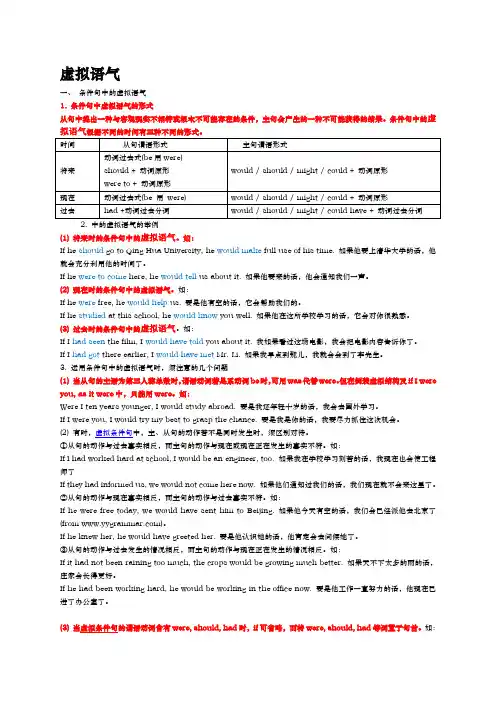
虚拟语气一、条件句中的虚拟语气1. 条件句中虚拟语气的形式从句中提出一种与客观现实不相符或根本不可能存在的条件,主句会产生的一种不可能获得的结果。
条件句中的虚拟语气根据不同的时间有三种不同的形式。
时间从句谓语形式主句谓语形式将来动词过去式(be用were)should + 动词原形were to + 动词原形would / should / might / could + 动词原形现在动词过去式(be 用were) would / should / might / could + 动词原形过去had +动词过去分词would / should / might / could have + 动词过去分词2. 中的虚拟语气的举例(1) 将来时的条件句中的虚拟语气。
如:If he should go to Qing Hua University, he would make full use of his time. 如果他要上清华大学的话,他就会充分利用他的时间了。
If he were to come here, he would tell us about it. 如果他要来的话,他会通知我们一声。
(2) 现在时的条件句中的虚拟语气。
如:If he were free, he would help us. 要是他有空的话,它会帮助我们的。
If he studied at this school, he would know you well. 如果他在这所学校学习的话,它会对你很熟悉。
(3) 过去时的条件句中的虚拟语气。
如:If I had seen the film, I would have told you about it. 我如果看过这场电影,我会把电影内容告诉你了。
If I had got there earlier, I would have met Mr. Li. 如果我早点到那儿,我就会会到了李先生。
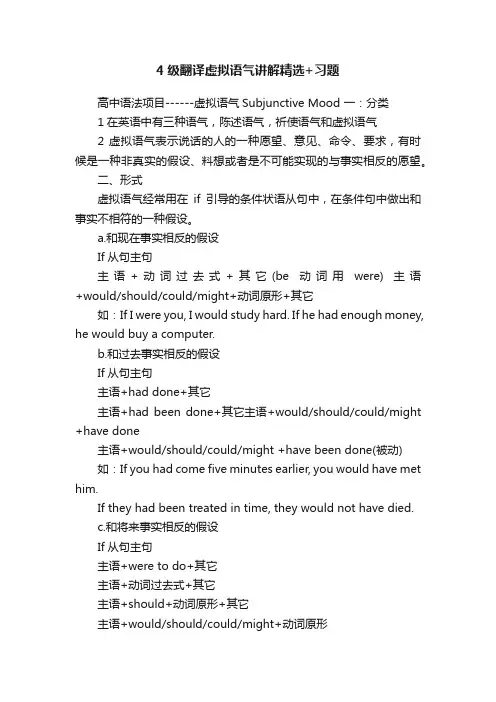
4级翻译虚拟语气讲解精选+习题高中语法项目------虚拟语气Subjunctive Mood 一:分类1在英语中有三种语气,陈述语气,祈使语气和虚拟语气2 虚拟语气表示说话的人的一种愿望、意见、命令、要求,有时候是一种非真实的假设、料想或者是不可能实现的与事实相反的愿望。
二、形式虚拟语气经常用在if引导的条件状语从句中,在条件句中做出和事实不相符的一种假设。
a.和现在事实相反的假设If从句主句主语+动词过去式+其它(be动词用were) 主语+would/should/could/might+动词原形+其它如:If I were you, I would study hard. If he had enough money, he would buy a computer.b.和过去事实相反的假设If从句主句主语+had done+其它主语+had been done+其它主语+would/should/could/might +have done主语+would/should/could/might +have been done(被动)如:If you had come five minutes earlier, you would have met him.If they had been treated in time, they would not have died.c.和将来事实相反的假设If从句主句主语+were to do+其它主语+动词过去式+其它主语+should+动词原形+其它主语+would/should/could/might+动词原形如:If I were to do it, I would do it in another day.If it rained tomorrow, we wouldn’t be able to go on picnic.d.混合条件句混合条件句是指条件句是对过去事实相反的假设,而主句则表示现在的某种情况。
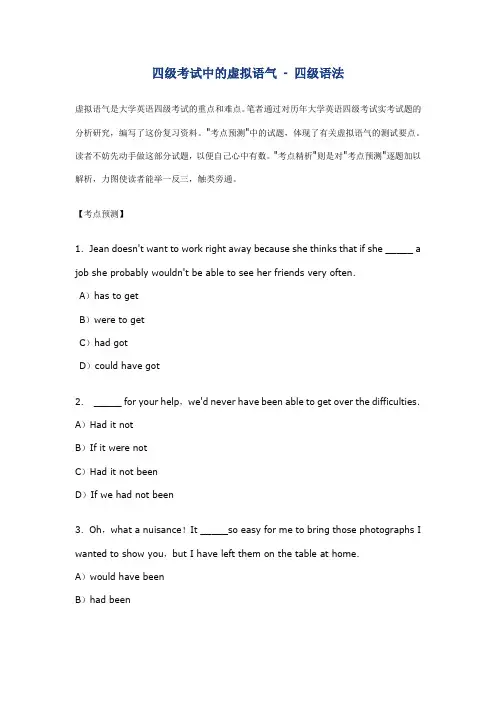
四级考试中的虚拟语气- 四级语法虚拟语气是大学英语四级考试的重点和难点。
笔者通过对历年大学英语四级考试实考试题的分析研究,编写了这份复习资料。
"考点预测"中的试题,体现了有关虚拟语气的测试要点。
读者不妨先动手做这部分试题,以便自己心中有数。
"考点精析"则是对"考点预测"逐题加以解析,力图使读者能举一反三,触类旁通。
【考点预测】1.Jean doesn't want to work right away because she thinks that if she _____ a job she probably wouldn't be able to see her friends very often.A)has to getB)were to getC)had gotD)could have got2._____ for your help,we'd never have been able to get over the difficulties.A)Had it notB)If it were notC)Had it not beenD)If we had not been3.Oh,what a nuisance!It _____so easy for me to bring those photographs I wanted to show you,but I have left them on the table at home.A)would have beenB)had beenC)would beD)was4.If we had been more careful,we _____much better results now.A)would be gettingB)would have gotC)gotD)had got5.He suggested_____ to tomorrow's exhibition together.A)us to goB)we wentC)we shall goD)we go6.It is recommended that the project _____until all the preparations have been made.A)is not startedB)will not be startedC)not be startedD)is not to be started7.It's necessary _____the dictionary immediately.A)that he will returnB)that he returnedC)that he returnD)that he has to return8.It is of the utmost importance that you _____here on time.A)beB)shall beC)are to beD)must be9.One of the requirements for a fire is that the material_____ to its burning temperature.A)is heatedB)will be heatedC)be heatedD)would be heated10.I wish I _____longer this morning,but I had to get up and come to class.A)could have sleptB)sleepC)might have sleptD)have slept11.It's already 5o'clock now.Don't you think it's about time _____A)we are going homeB)we go homeC)we went homeD)we can go home12.The mad man was put in the soft-padded cell lest he _____himself.A)injureB)had injuredC)injuredD)would injure13.That tree looked as if it _____for a long time.A)hasn't wateredB)didn't waterC)hadn't been wateredD)wasn't watered14.I'd rather you _____anything about it for the time being.A)don't doB)didC)didn't doD)would do15.Look at the terrible situation I am in!If only I _____your advice.A)followB)had followedC)would followD)have followed【考点精析】1正确答案为选项B。
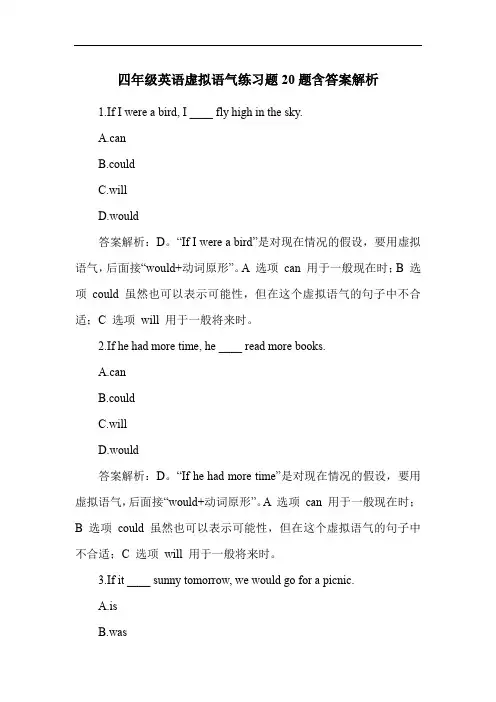
四年级英语虚拟语气练习题20题含答案解析1.If I were a bird, I ____ fly high in the sky.A.canB.couldC.willD.would答案解析:D。
“If I were a bird”是对现在情况的假设,要用虚拟语气,后面接“would+动词原形”。
A 选项can 用于一般现在时;B 选项could 虽然也可以表示可能性,但在这个虚拟语气的句子中不合适;C 选项will 用于一般将来时。
2.If he had more time, he ____ read more books.A.canB.couldC.willD.would答案解析:D。
“If he had more time”是对现在情况的假设,要用虚拟语气,后面接“would+动词原形”。
A 选项can 用于一般现在时;B 选项could 虽然也可以表示可能性,但在这个虚拟语气的句子中不合适;C 选项will 用于一般将来时。
3.If it ____ sunny tomorrow, we would go for a picnic.A.isB.wasC.wereD.will be答案解析:C。
“If it were sunny tomorrow”是对将来情况的假设,要用虚拟语气,be 动词在虚拟语气中一般用were。
A 选项is 用于一般现在时;B 选项was 用于一般过去时;D 选项will be 用于一般将来时。
4.If I had a magic wand, I ____ make all my dreams come true.A.canB.couldC.willD.would答案解析:D。
“If I had a magic wand”是对现在情况的假设,要用虚拟语气,后面接“would+动词原形”。
A 选项can 用于一般现在时;B 选项could 虽然也可以表示可能性,但在这个虚拟语气的句子中不合适;C 选项will 用于一般将来时。
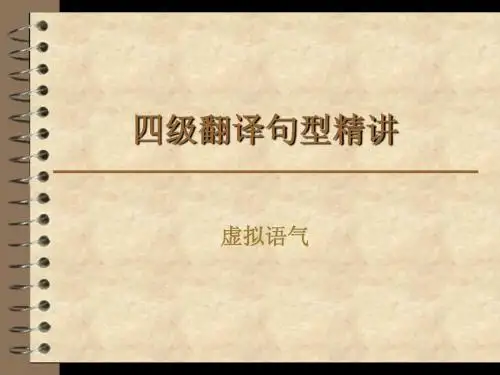
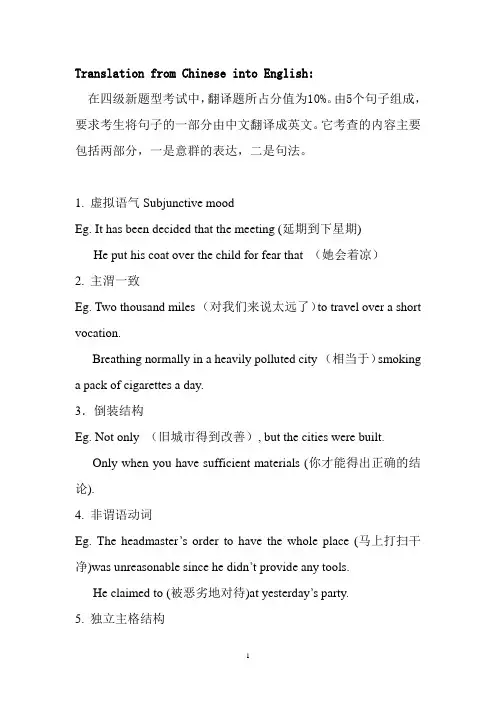
Translation from Chinese into English:在四级新题型考试中,翻译题所占分值为10%。
由5个句子组成,要求考生将句子的一部分由中文翻译成英文。
它考查的内容主要包括两部分,一是意群的表达,二是句法。
1.虚拟语气Subjunctive moodEg. It has been decided that the meeting (延期到下星期) He put his coat over the child for fear that (她会着凉)2.主渭一致Eg. Two thousand miles (对我们来说太远了)to travel over a short vocation.Breathing normally in a heavily polluted city (相当于)smoking a pack of cigarettes a day.3.倒装结构Eg. Not only (旧城市得到改善), but the cities were built.Only when you have sufficient materials (你才能得出正确的结论).4.非谓语动词Eg. The headmaster’s order to have the whole place (马上打扫干净)was unreasonable since he didn’t provide any tools.He claimed to (被恶劣地对待)at yesterday’s party.5.独立主格结构Eg. A large fish was slowly swimming through the water, its tail (来回摆动)like the pendulum of a clock.(这么多人不在), we decided to put the meeting off.6.时态Eg. By the time we got there, the play (已经开始了)When I saw her last night, she (正在练习英语口语)7.从句Eg. (月亮环绕地球转动)is well known to all of us.How many students are there in your class(父母在政府机关工作)?8.强调句Eg. (给我们印象最深的)were her liveliness and sense of humor.(不是我而是你)who are the first to run to the goal in that competition.9.比较结构Eg. These engines are (不如我们制造的那些发动机功率大)The machine is (在很多方面比那台好)样题:The substance does not dissolve in water (不管是否加热)Not only (他向我收费过高), but he didn’t do a good repair job either.Y our losses in trade this year are nothing (与我的想比)On average, it is said, visitors spend only (一半的钱)in a day in Leeds as in London.By contrast, American mothers were more likely (把孩子的成功归因于)natural talent.解题技巧1)首先,确定关键词(一般由两个词或词组组成),寻找可能的英文相应表达;2)然后,利用相应的语法结构或功能连接方式(connectives)将两个英文词或词组连接起来;3)最后,结合待翻译的文字在句子中所处的位置与功能,根据句法结构理顺语言。
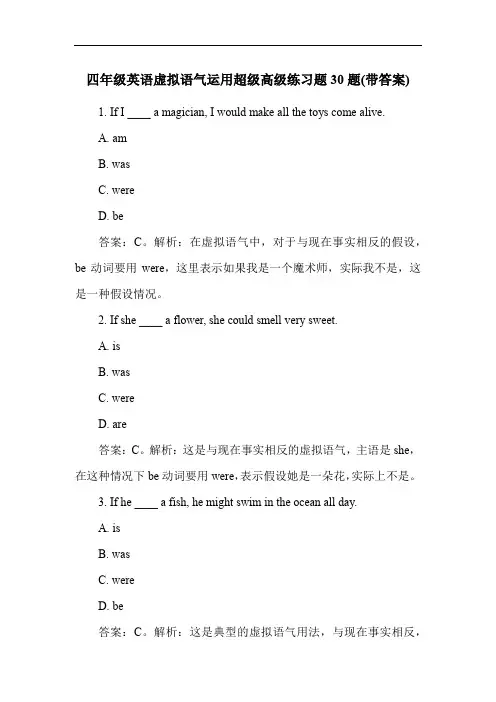
四年级英语虚拟语气运用超级高级练习题30题(带答案)1. If I ____ a magician, I would make all the toys come alive.A. amB. wasC. wereD. be答案:C。
解析:在虚拟语气中,对于与现在事实相反的假设,be动词要用were,这里表示如果我是一个魔术师,实际我不是,这是一种假设情况。
2. If she ____ a flower, she could smell very sweet.A. isB. wasC. wereD. are答案:C。
解析:这是与现在事实相反的虚拟语气,主语是she,在这种情况下be动词要用were,表示假设她是一朵花,实际上不是。
3. If he ____ a fish, he might swim in the ocean all day.A. isB. wasC. wereD. be答案:C。
解析:这是典型的虚拟语气用法,与现在事实相反,主语是he时,be动词用were,表示假设他是一条鱼,实际并非如此。
4. If we ____ birds, we would fly to the moon.A. areB. wasC. wereD. be答案:C。
解析:对于与现在事实相反的假设,当主语是we时,be动词用were,这里假设我们是鸟,实际不是。
5. If my sister ____ a star, she would shine brightly in the sky.A. isB. wasC. wereD. be答案:C。
解析:这是虚拟语气,与现在事实相反,主语是my sister,be动词要用were,表示假设我妹妹是一颗星,实际不是。
6. If the cat ____ a person, it could talk to us.A. isB. wasC. wereD. be答案:C。
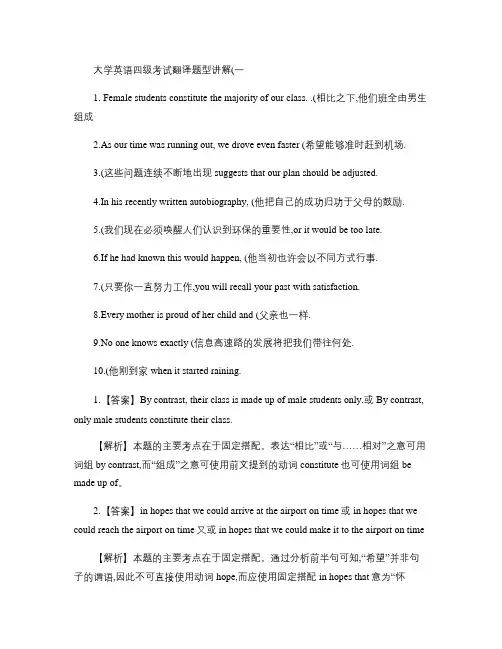
大学英语四级考试翻译题型讲解(一1. Female students constitute the majority of our class. .(相比之下,他们班全由男生组成2.As our time was running out, we drove even faster (希望能够准时赶到机场.3.(这些问题连续不断地出现suggests that our plan should be adjusted.4.In his recently written autobiography, (他把自己的成功归功于父母的鼓励.5.(我们现在必须唤醒人们认识到环保的重要性,or it would be too late.6.If he had known this would happen, (他当初也许会以不同方式行事.7.(只要你一直努力工作,you will recall your past with satisfaction.8.Every mother is proud of her child and (父亲也一样.9.No one knows exactly (信息高速路的发展将把我们带往何处.10.(他刚到家when it started raining.1.【答案】By contrast, their class is made up of male students only.或By contrast, only male students constitute their class.【解析】本题的主要考点在于固定搭配。
表达“相比”或“与……相对”之意可用词组by contrast,而“组成”之意可使用前文提到的动词constitute也可使用词组be made up of。
2.【答案】in hopes that we could arrive at the airport on time或in hopes that we could reach the airport on time又或in hopes that we could make it to the airport on time【解析】本题的主要考点在于固定搭配。
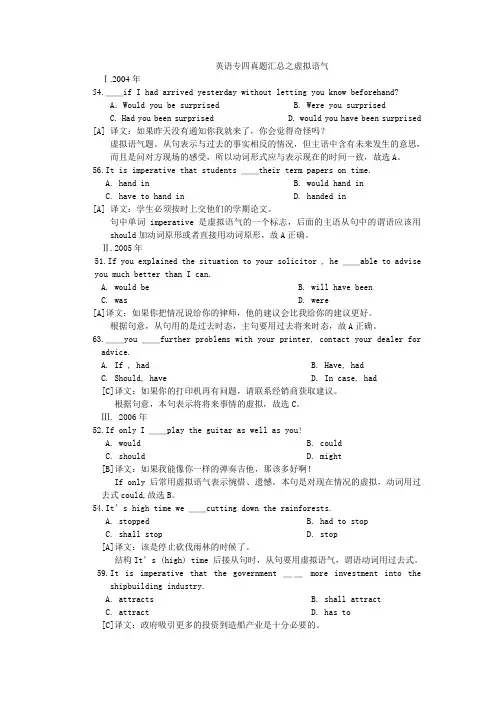
英语专四真题汇总之虚拟语气Ⅰ.2004年54.__if I had arrived yesterday without letting you know beforehand?A.Would you be surprised B. Were you surprisedC. Had you been surprisedD. would you have been surprised[A] 译文:如果昨天没有通知你我就来了,你会觉得奇怪吗?虚拟语气题。
从句表示与过去的事实相反的情况,但主语中含有未来发生的意思,而且是问对方现场的感受,所以动词形式应与表示现在的时间一致,故选A。
56.It is imperative that students __their term papers on time.A. hand inB. would hand inC. have to hand inD. handed in[A] 译文:学生必须按时上交他们的学期论文。
句中单词imperative是虚拟语气的一个标志,后面的主语从句中的谓语应该用should加动词原形或者直接用动词原形,故A正确。
Ⅱ.2005年51.If you explained the situation to your solicitor , he __able to adviseyou much better than I can.A. would beB. will have beenC. wasD. were[A]译文:如果你把情况说给你的律师,他的建议会比我给你的建议更好。
根据句意,从句用的是过去时态,主句要用过去将来时态,故A正确。
63.__you __further problems with your printer, contact your dealer foradvice.A. If , hadB. Have, hadC. Should, haveD. In case, had[C]译文:如果你的打印机再有问题,请联系经销商获取建议。
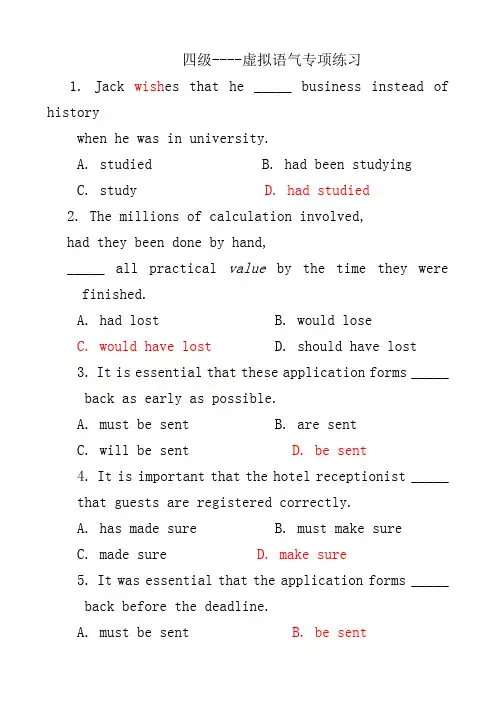
四级----虚拟语气专项练习1. Jack wish es that he _____ business instead of historywhen he was in university.A. studiedB. had been studyingC. studyD. had studied2. The millions of calculation involved,had they been done by hand,_____ all practical value by the time they were finished.A. had lostB. would loseC. would have lostD. should have lost3. It is essential that these application forms _____back as early as possible.A. must be sentB. are sentC. will be sentD. be sent4. It is important that the hotel receptionist _____that guests are registered correctly.A. has made sureB. must make sureC. made sureD. make sure5. It was essential that the application forms _____back before the deadline.A. must be sentB. be sentC. would be sentD. were sent6. It's necessary _____ the dictionary immediately.A. that he will returnB. that he returnC. that he returnedD. that he has to return7. It is important that enough money _____to fund the project.A. be collectedB. was collectedC. must be collectedD. can be collected8. I don't think it advisable that Tom _____to the job since he has no experience.A. is assignedB. be assignedC. will be assignedD. has been assigned9. The that the mayor _____the prizes was accepted by everyone.A. would presentB. presentC. ought to presentD. presents10. We are all for your proposal that the discussion_____.A. be put offB. should put offC. was put offD. is to put off11. You _____ him so closely;you should have kept your distance.A. shouldn't have been followingB. mustn't followC. couldn't have been followingD. shouldn't follow12. The manager would rather his daughter _____ in the same office.A. does not workB. had not workedC. not to workD. did not work13. Wouldn't you rather your child _____ to bed early?A. goB. would goC. wentD. goes14. I'd rather you _____ make any comment on the issue for the time being.A. don'tB. didn'tC. wouldn'tD. shouldn't15. Mike's uncle insists _____ in this hotel.A. staying notB. that he would not stayC. not to stayD. that he not stay16. As Commander-in-Chief of the armed forces, I havedirected that all measures ____ for our defense.A. had been takenB. be takenC. would be takenD. to be taken17. The manager of the hotel requests that their guests _____ after 11:00 .A. not to play loud musicB. don't play loud musicC. shouldn't play loud musicD. couldn't paly load music18. We desire that the tour leader ____ us immediately of any change in plans.A. informB. informsC. informedD. has informed19. He suggested _____ to tomorrow's exhibition together.A. us to goB. we shall goC. we wentD. we go20. Sometimes I wish I _____ in a different time anda different place.A. be livingB. would liveC. were livingD. would have lived21. I wish I _____ longer this morning, but I had to get up and come to class.A. could have sleptB. might have sleptC. sleptD. have slept22. Jean doesn't want to work right away because shethinks that if she _____ a job she probably wouldn'tbe able to see her friends very often.A. has to getB. had gotC. were to getD. could have got23. If the whole operation ____ beforehand, a greatdeal of time and money would have been lost.A. was not plannedB. had not been plannedC. has not been plannedD. were not planned24. Had he worked harder, he _____ the exams.A. must have got throughB. would get throughC. would have got throughD. could get through25. _____ before we depart the day after tomorrow, we should have a wonderful dinner party.A. Had they arrivedB. Were they arrivingC. Would they arriveD. Were they to arrive26. _____ right now, she would get there on Sunday.A. Would she leaveB. Were she to leaveC. If she leavesD. If she had left27. _____ for my illness I would have lent him a helping hand.A. Not beingB. Without beingC. Had it not beenD. Not having been28. _____ for your laziness, you could have finished the assignment by now.A. Had it not beenB. Weren't itC. It were notD. Had not it been29. If it _____ too much trouble, I'd love a cup of tea.A. isn'tB. weren'tC. wasn'tD. hadn't been30. If I hadn't stood under the ladder to catch you when you fell, you _____ now.A. wouldn't be smilingB. won't smileC. couldn't have smiledD. didn't smile31. We didn't know his telephone number; otherwise we _____ him.A. would have telephonedB. would telephoneC. must have telephonedD. had telephoned32. He must have had an accident, or he _____ then.A. would have been hereB. should be hereC. had to be hereD. would be here33. Some women ____ a good salary in a job instead ofstaying home, but they decided not to work for thesake of the family.A. must makeB. should have madeC. would makeD. could have made34. We _____ to start our own business, but we never had enough money.A. have hopedB. had hopedC. would hopeD. should hope35. The mad man was put in the soft-padded cell lest he _____ himself.A. injureB. injuredC. had injuredD. would injure36. "You are very selfish. It's high time you _______that you are not the most important person in theworld", Edgar said to his boss angrily.A. realizedB. realizeC. have realizedD. should realize37. It's already 5 o'clock now. Don't you think it's about time _____ ?A. we are going homeB. we went homeC. we go homeD. we can go home38. If only the committee _____ the regulations and put them into effect as soon as possible.A. approveB. can approveC. will approveD. would approve39. Look at the terrible situation I am in! If onlyI _____ your advice.A. followB. would followC. had followedD. have followed40. I'm sure he is up to the job ____ he would give his mind to it.A. if onlyB. in caseC. untilD. unless41. You don't have to be in such a hurry. I would rather you _____ on business first.A. would goB. will goC. wentD. have gone42. Frankly speaking, I'd rather you _____ anything about it for the time being.A. didn't doB. haven't doneC. don't doD. have done43. It is politely requested by the hotel managementthat radios ______ after 11 o'clock at night.A. were not playedB. not be playedC. not to playD. did not play44. It is recommended that the project _____ until all the preparations have been made.A. is not startedB. not be startedC. will not be startedD. is not to be started45. Many a delegate was in favor of his proposal thata special committee ________ to investigate theincident.A. were set upB. was set upC. be set upD. set up46. Things might have been much worse if the mother ______ on her right to keep the baby.A. has been insistingB. had insistedC. would insistD. insisted答案与解析1. D译文:杰克宁愿在大学学的是商务而不是历史。
四级语法专项练习题虚拟语气四级语法专项练习题-虚拟语气1. The lecture bored me to death. I wish I ______ it.A)could not have attended C)have not attendedB)did not attend D)had not attended2. _____his timely arrival, the boy would have been drowned.A)But for B)Even if C)Except for D)If not3. He _____ ice-cream on the beach if his father _____ last year, leaving nothing but debts.A)were to be selling…should die B)would not be selling…had diedC)would be sell ing…had not died D)would not be selling…had not died4. At the last committee meeting, the motion that the club _____ open until midnight was defeated.A)would remain B)remain C)remained D)be remained5. The sun rises in the east and sets in the west, so it seems as if the sun ______round the earth.A)were circling B)is circling C)be circling D)circles6. ______, we shall go on a picnic.A)If the weather to be fine B)Had the weather been fineC)If the weather be fine D)Should the weather be fine7. They must have liked the apartment, or they ______ so long.A)didn’t stay B)won’t stayC)wouldn’t have stayed D)wouldn’t stay8. Had she been older, she_____ less sympathetic.A)might have been B)would beC)might be D)had been9. I will be obliged if you_____ me.A)could be able to help B)would be able to helpC)would help D)could help10. He_____ ten lectures on African literature, but he only gave three because of his illness.A)must have given B)gaveC)should have given D)had given11.Through worldly loss he came to an insight into spiritual truth to which he might______ have been a stranger.A)no more B)no less C)neither D)otherwise12. “My hat was here a second ago but now it’s missing. Someone_____ a joke about me!”A)must have made B)must be makingC)must make D)must have been made13. Mrs. Bliss kept the door and the windows shut lest the noise outside_____ her son’s sleep.A)would interfere with B)interfered withC)had interfered with D)should interfere with14. It is strange that such a thing_____ in your school.A)happens B)happened C)should happen D)had happened15. His advice has made the design better than it_____.A)had otherwise been B)would be otherwiseC)has otherwise be D)would otherwise have been16. You_____ all these parcels yourself. The shop would have delivered them if you had asked them.A)didn’t need to carry B)could not carryC)didn’t have to carry D)needn’t have carried17. He burned all the important documents for fear that they_____ into the enemy’s handsA)might fall B)should fallC)would fall D)will fall18. It would have been just as satisfactory if I_____ at home. Ilearned nothing in class.A)had stayed B)was stayingC)stayed D)would stay19. Had electronic computers not been invented, many problems on space flight_____.A)could not have been solved B)could not be solvedC)can not be solved D)could not have solved20. He took his raincoat with him lest it___.A)rained B)should rain C)would rain D)rains21. I’d rather you just___ in bed and___ anything for at least two weeks.A)stayed; di dn’t do B)stayed; don’t do C)stay; don’tD)stayed; did22. The doctor ordered that the wounded soldiers___ to the hospital without any delay.A)be sent C)will be sent B)have been sent D)must be sent23. What do you think of his proposal that we___ put on a play at the English evening?A)have B)will C)has D)should24. No one would imagine that this city was just a night’s journey from here. It seemed as though___ in another world.A)it being of B)it were C)it was D)it to be答案1 d2 a3 d4 c5 a6 d7 b8 a9 d 10 b 11d 12 a 13 d 14 c 15 d 16 d 17 c 18 a 19 a 20 c 21a 22 a 23 d 24 b25. I wish nothing___ prevent them from coming.A)shall B)would C)will D)can26. Your examination results were quite satisfactory, but___ if you had spent less time in playing football?A)won’t they have been better B)won’t they be betterC)wouldn’t they be better D)wouldn’t they have been better27. If we___ more freedom in choosing courses, we would have had more motivation to study.A)were given B)could been given C)had been given D)had given28. It is extremely urgent that they___ from the mountain before dark.A)must rescue C)will be rescuedB)be rescued D)shall be rescued29. But that we saw it, he___ it.A)can’t believe C)could not have believedB)could not believe D)did not believe30. If you___ next week, I might have time to see you again.A)are to come C)was to come B)come D)were to come31. If I___ the TV set, I should be glad to help you.A)can be able to repair C)shall be able to repairB)will be able to repair D)could repair32. For a child to give up his less mature idea for a more mature one, it requires that the child___ psychologically ready for the new idea.A)would be B)were C)be D)is33. I___ do that if I were given the choice.A)had rather not C)would not ratherB)rather not D)would rather not34. “where have you been?”“I got caught in traffic;___ I would have been here sooner.”A)anyway B)otherwise C)although D)however35. ___to me, he would not to be in such trouble now.A)If he listened C)Should he listenB)If he would listen D)Had he listened36. ___,he would have been a rich man.A)If he was to enter business C)Had he entered businesB)Was he to enter business D)If he were to enter business37. ___,I wouldn’t have gone to the film last night.A)If I had been you C)If I were you B)If I was you D)If I am you 38, It is important that the results of an experiment____A)check and recheck C)be checked and recheckedB)checking and rechecking D)checked and rechecked39. ___for your help, we’d never have been able to get over the difficulties.A)If we had not been C)If it were notB)Had it not D)Had it not been40. I___ you with the funds. Why didn’t you ask me?A)should provide C)had providedB)could provide D)could have provided41. He demands that she ___his own recordsA)keeps B)may keep C)is keeping D)keep42.If it ______tomorrow , they would not go out .A)would have snowed C)snows B)will snow D)were to snow43. _______,we should be glad.A)Were they coming tomorrow C)They come tomorrowB)They would come tomorrow D)Were they to cometomorrow44. He would be studying at the university now if he ______the entrance examination .A)passed B)have passed C)had passed D)should have passed45. It __ around eight o’clock when I drove back home because it was already dark.A)must have been B)was to be C)must be D)had to be46. The accomplishment of modern medicine would be impossible __highly specialized instruments.A)without B)but without C)but there are D)among47. It was feared that the strain of continued isolation and rough weather __their nerves.A)affect B)might affect C)may affect D)affects48. If I__ to go .I would certainly go .A)will be asked C)should be askedB)have been asked D)had asked49. “He is already on the wrong side of forties.”“It’s about time he__ himself a wife and settled down.”A)finds B)should find C)found D)had found答案25 b 26 d 27 c 28 b 29 c 30 d 31 d 32 c 33 d 34 b 35 d 36 c37 c 38 c 39 d 40d 41 d 42 d 43 d 44 c 45 a 46 a 47 b 48 b 49 c。
专四虚拟语气练习01.What would you do if you _________ a million dollars?A. haveB. have hadC. hadD. shall have02.Even if I _________, I wouldn’t.A. canB. shallC. couldD. will03.If he were alive, he _________ twenty years old now.A. will beB. would beC. would have beenD. is04.I don’t think you _________ me even if I told you the truth.A. will believeB. would have believedC. would believeD. believed05.If I had not called for a doctor, your friend_________.A. had diedB. will have diedC. will dieD. would have died06.I would have married her if she _________ such an extravagant girlA. were notB. wouldn’t beC. would have beenD. hadn’t been07.If it _________ convenient, let’s meet at nine o’clock.A. isB. beingC. wasD. were08.If he _________ in a day or two, I would wait for him.A. will returnB. returnsC. were to returnD. had return09.If he _________ late, give him the message.A. were comingB. would comeC. should comeD. were coming10.________ the doctor come a little sooner, the patient would have been saved.A. HadB. ShouldC. WereD. If11._________ he aid, I could not have succeeded.A. ButB. WithoutC. NotD. Unless12.I _________ abroad last year but for my illness.A. would goB. would have goneC. had goneD. went13.I _________ had it not been that he grasped me.A. should have fallen b. should fall C. had fallen D. fell14.I wish I _________ as tall as she.A. isB. amC. wereD. be15.Oh, if only _________ your advice then.A. takeB. tookC. should takeD. had taken16.She talked and acted as if she _________ abroad for a long time.A. would have livedB. might haveC. livedD. had lived17.Mr. Smith is, _________, a walking dictionary.A. as it isB. as thoughC. as it wereD. as if 18.He would rather people _________ about his family.A. not talkedB. haven’t talkedC. didn’t talkD. wouldn’t have talked19.What if I _________?A. failedB. should failedC. would failD. had failed20.If he _________in Germany, what language would he probably speak now?A. had bornB. have been bornC. had been bornD. would have been born改错:21.They are the ones who assert that a better bridge could have been built have we hadtheir assistance.22.Had anyone asked him, Barlow could tell the investigators some useful details aboutthe robbery.23.If the cook had been more careful in measuring the ingredients, the dinner will havebeen much better.24.If you had listened, you too would have concluded that Peter is more capable thanany other boy in his class.25.Helen will graduate with her class if she had been able to meet all of therequirements in time.26.Had they had enough cash on hand, they will buy this fancy furniture.27.If the volume of British investment is to be increased, other demands on nationalresources would have to be reduced or eliminated.28.Sometimes I get the idea that a student is expected o think about getting educatedfor the sake of society as if he is not a part of it.29.I sometimes wish that my university is as large as the State University because ourfacilities are more limited than theirs.30.You have confessed that you are sorry for your rebellion. So I will recommend thatyou will not be punished.。
CET4,大学英语4级,语法,虚拟语气专项练习题虚拟语气专项练习题附答案[历年MBA考题]21.If you had taken your umbrella with you when you went to work this morning, you ______ wet now.A.will not beB.will not have beenC.would not beD.would not have been22.If this university ______ such a good reputation, I would not have come here.A.didn't haveB.doesn't haveC.would not beD.would not have been23.She did not go to the North, instead she remained here in the South.The doctor suggested that she ______ there.A.not goB.go notC.couldn't goD.didn't go24. ______ , call the police.A.If anyone will attempt to break inB.Would anyone attempt to break inC.Anyone should attempt to break inD.Should anyone attempt to break in[历年考研试题]25.There is a real possibility that these animals could be frightened, ______ a sudden loud noise.A.being thereB.should there beC.there wasD.there having been26.In the past men generally preferred that their wives ______ in the home.A.workedB.would workC.workD.were working27.The board deemed it urgent that these files ______ right away.A.had to be printedB.should have been printedC.must be printedD.should be printed28.The millions of calculations involved, had they been done by hand, all practical value ______ by the time they were finished.A.could loseB.would have lostC.might loseD.ought to have lost29.A safety analysis ______ the target as a potential danger.Unfortunately, it was never done.A.would identifyB.will identifyC.would have identifiedD.will have identified30.I'd rather you ______ by train, because I can't bear the idea of your being in an airplane in such bad weather.A.would goB.should goC.wentD.had gone31. When Edison died, it was proposed that the American people ______ all power in their homes, streets, and factories for several minutes in honor of this great man.A.turn offB.turned offC.would turn offD.had turned off32. I apologize if I you ______ , but I assure you it was unintentional.A.offendB.had offendedC.should have offendedD.might have offended33. ______ for the timely investment from the general public, our company would not be so thriving as it is.A.Had it not beenB.Were it notC.Be it notD.Should it not be [suggested keys] CAADB CDBCC ABA。
四年级英语虚拟语气练习题20题答案解析版1.If I were a bird, I ______ fly in the sky.A.canB.couldC.willD.would答案解析:D。
如果我是一只鸟,这是一种假设的情况,在虚拟语气中,be 动词要用were,对于现在的假设,主句要用“would+动词原形”。
A 选项can 表示能力,在虚拟语气中不合适;B 选项could 通常用于表示过去的能力;C 选项will 用于一般将来时,不是虚拟语气的用法。
2.If he had time, he ______ go to the park.A.willB.wouldC.canD.could答案解析:B。
如果他有时间,这是对现在情况的假设,虚拟语气中,主句用“would+动词原形”。
A 选项will 不是虚拟语气用法;C 选项can 表示能力,不合适;D 选项could 通常用于表示过去的能力。
3.If I had a magic wand, I ______ make all my dreams come true.A.willB.wouldC.canD.could答案解析:B。
如果我有一根魔法棒,这是假设的情况,对于现在的假设,主句用“would+动词原形”。
A 选项will 不是虚拟语气用法;C 选项can 表示能力,不合适;D 选项could 通常用于表示过去的能力。
4.If she were a princess, she ______ live in a castle.A.willB.wouldC.canD.could答案解析:B。
如果她是一位公主,这是假设的情况,虚拟语气中,主句用“would+动词原形”。
A 选项will 不是虚拟语气用法;C 选项can 表示能力,不合适;D 选项could 通常用于表示过去的能力。
5.If we had a lot of money, we ______ travel around the world.A.willB.wouldC.canD.could答案解析:B。
四年级英语虚拟语气练习题20题(答案解析)1.If I had magic powers, I _____ make everyone happy.A.wouldB.willC.shallD.can答案解析:A。
本题考查与现在事实相反的虚拟语气,其结构为“if+主语+动词过去式,主语+would/could/should/might+动词原形”。
选项B、C、D 均不符合虚拟语气的用法。
2.If animals could talk, they _____ us many interesting stories.A.tellB.would tellC.toldD.will tell答案解析:B。
同样是与现在事实相反的虚拟语气,所以用“would+动词原形”。
选项A、C、D 都不是虚拟语气的正确表达。
3.If I were a bird, I _____ fly freely in the sky.A.canB.willC.wouldD.shall答案解析:C。
与现在事实相反的虚拟语气,“would+动词原形”。
选项A、B、D 错误。
4.If he _____ a superhero, he would save the world.A.isB.wereC.wasD.will be答案解析:B。
在虚拟语气中,be 动词一律用were。
选项A、C、D 不符合虚拟语气规则。
5.If she had a time machine, she _____ go back in time.A.wouldB.willC.canD.shall答案解析:A。
与现在事实相反的虚拟语气结构,“would+动词原形”。
选项B、C、D 错误。
6.If we _____ magic wands, we could make all our dreams come true.A.haveB.hadC.will haveD.would have答案解析:B。
四年级英语虚拟语气运用超级高级练习题30题(答案解析)1.If I were a bird, I ______ fly freely in the sky.A.canB.couldC.willD.would答案解析:D。
本题考查虚拟语气中与现在事实相反的情况。
“If I were a bird”是虚拟条件句,表示与现在事实相反,此时主句谓语动词要用“would+动词原形”,所以选D。
A 选项can 表示能力,一般现在时;B 选项could 可以表示委婉语气或者过去的能力;C 选项will 用于一般将来时,均不符合虚拟语气与现在事实相反的用法。
2.If he had time, he ______ go to the park.A.canB.couldC.willD.would答案解析:D。
“If he had time”是与现在事实相反的虚拟条件句,主句谓语动词用“would+动词原形”,选D。
A 选项can 现在时表示能力;B 选项could 可表委婉语气或过去能力;C 选项will 用于一般将来时,都不符合虚拟语气要求。
3.If I had a magic wand, I ______ make all my wishes come true.A.canB.couldC.willD.would答案解析:D。
“If I had a magic wand”是虚拟条件句,与现在事实相反,主句用“would+动词原形”,选D。
A 选项can 现在时能力;B 选项could 委婉或过去能力;C 选项will 一般将来时,均不适用。
4.If she were taller, she ______ play basketball better.A.canB.couldC.willD.would答案解析:D。
“If she were taller”是与现在事实相反的虚拟条件句,主句“would+动词原形”,选D。
高中语法项目------虚拟语气Subjunctive Mood 一:分类1在英语中有三种语气,陈述语气,祈使语气和虚拟语气2 虚拟语气表示说话的人的一种愿望、意见、命令、要求,有时候是一种非真实的假设、料想或者是不可能实现的与事实相反的愿望。
二、形式虚拟语气经常用在if引导的条件状语从句中,在条件句中做出和事实不相符的一种假设。
a.和现在事实相反的假设If从句主句主语+动词过去式+其它(be动词用were) 主语+would/should/could/might+动词原形+其它如:If I were you, I would study hard. If he had enough money, he would buy a computer.b.和过去事实相反的假设If从句主句主语+had done+其它主语+had been done+其它主语+would/should/could/might +have done主语+would/should/could/might +have been done(被动)如:If you had come five minutes earlier, you would have met him.If they had been treated in time, they would not have died.c.和将来事实相反的假设If从句主句主语+were to do+其它主语+动词过去式+其它主语+should+动词原形+其它主语+would/should/could/might+动词原形如:If I were to do it, I would do it in another day.If it rained tomorrow, we wouldn’t be able to go on picnic.d.混合条件句混合条件句是指条件句是对过去事实相反的假设,而主句则表示现在的某种情况。
If从句主句主语+had done+其它主语+would/should/could/ might +be+表语主语+would/should/could/might +be+doing 主语+would/should/could/might+动词原形三、注意事项①如果从句中有were、had或者should时,则可以省略if,并将were、had或者should提前至句首,构成部分倒装,但如果是否定句,则否定词not不提前。
如:Were I to be young again, I would study medicine.=If I were to be young again, I would study medicine.Had you not left so early, you might have missed the train.=If you had not left so early, you might have missed the train.②用介词短语代替条件状语从句,常用的介词有with, without, but for.如:Without your help, we couldn’t have finished the work ahead of time.=But for your help, we couldn’t have finished the work ahead of time.=If it had not been for your help, we couldn’t have finished the work ahead of time.=Had it not been for your help, we couldn’t have finished the work ahead of time.③在句中出现了表示转折的连词,如or, or else, otherwise等,如果句意和事实不符也要用虚拟语气。
如:You did what you were asked to, otherwise you would have been punished.④如果句子中有短语for fear that, lest, in case时,要用should+动词原形来表示虚拟,should可以省略。
如:He is working hard for fear that he fail.⑤如果句子前半部分是虚拟,句中出现了but,后面句子则不用虚拟语气。
如:I would have come earlier, but I didn’t know that you were waiting for me.The house would have been burnt down but the firefighters arrived in time.四、虚拟语气在名词性从句中的应用1.虚拟语气用在宾语从句中a.虚拟语气用在宾语从句中,不表示“和事实相反的假设”而表示说话者的一种意愿、决心、要求、命令和建议。
“一、二、三、四”“一坚持insist二命令order, command三建议advise, suggest, propose四要求ask, require, request, dem and”虚拟形式“在从句谓语动词前加should,should可以省略。
My teacher suggested that I (should) spend more time learning English.She suggested we (should)leave here at once.The doctor ordered she should be operated.注意:当suggest翻译成“暗示、表明”;insist翻译成“坚持认为、坚持说”,坚持的是一种事实,而不是表示一种命令或者要求时,不应该用虚拟语气,应该用陈述语气。
The smile on her face suggested that he was satisfied with our work.The man insisted that he had never stolen the monry.b.在would rather后的宾语从句中也要用虚拟语气。
对现在、将来虚拟:一般过去时(did/be用were)would rather对过去的虚拟:过去完成时(had done0I would rather you came tomorrow.I would rather they didn’t hear of the news.c. wish + 宾语从句表示不能实现的愿望,译为“要是……就好了”等。
表示现在不能实现的愿望,从句中的谓语动词用一般过去时;表示将来不能实现的愿望,从句中的谓语动词用“would/could + 动词原形”;表示过去不能实现的愿望,从句中的谓语动词用“had + 过去分词”或“could(should) + have + 过去分词”。
对现在虚拟一般过去时(did/be用were)对过去虚拟过去完成时(had done)对将来虚拟过去将来时(would do)I wish I were a flying bird and could fly freely in the sky.I wish I had met that film star yesterday.How I wish it would be fine tomorrow!注意:how I wish…=if only(要是……就好了),虚拟和wish虚拟用法一致。
2.虚拟语气用在主语从句中a. It is/was +adj.+ that+主语+should do (should可以省略)adj:advisable,amazing,astonishing,better,clear,certain,desirable,good,interesting,impo-ssible, normal,necessary,possible…It is natural that he (should) think so.It was necessary that the plan should be planned carefully.b. It is/ was+ n.+ that+主语+should do(should可以省略)①表示“惊奇、怀疑、遗憾”等意义的名词词组,如: a fact, a good thing, a pity, a shame, a wonder …②表示“请求、命令、建议、决心”等意义的名词,如advice, demand, decision, order, proposal, requirement, suggestion …It is a pity she should say so.It was her order that the matter should be discussed.③It is/was+过去分词+that+主语+should do(should可以省略)用在该句型中的动词过去分词表示“请求、命令、建议”等。
It is requested that Miss Li should give a performance at the party.④It is (high) time that+主语+did/should do,should不可以省略到做……的时间了。
It’s time that I picked up my daughter.It’s high time we were going.3.虚拟语气用在表语从句中用在advise, idea, order, plan, suggestion, demand, proposal等后面的表语从句,需用“should do”构成谓语,should可以省略。
What I suggest is that we should start the work at once.His order is that the meeting should be called off.4.虚拟语气用在同位语从句中当demand, insist, decide, determine, recommend, suggest这些动词的名词形式后跟同位语从句时,要用虚拟语气,用should do表示虚拟。
Not all of them agreed to my suggestion that more money should be given to them.His request that he should be given a rise was turned down at the meeting.5.虚拟语气用在目的状语从句中,in order that, so that…用情态动词I got up early this morning so that I could catch the bus to Boston.6.在as if, as though引导的方式状语从句中a. as if, as though引导的状语从句是否用虚拟取决于从句所描绘的情况,如果情况与事实相符就可以不用虚拟,否则就要用虚拟语气。